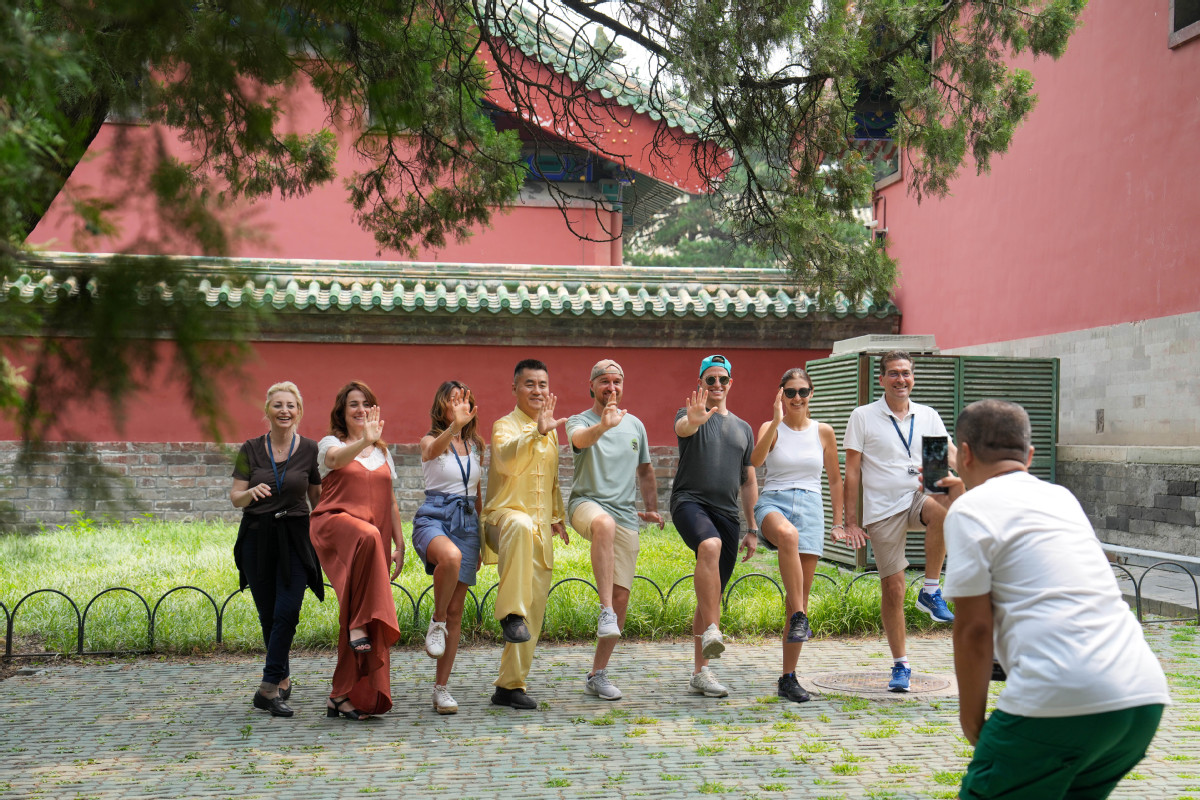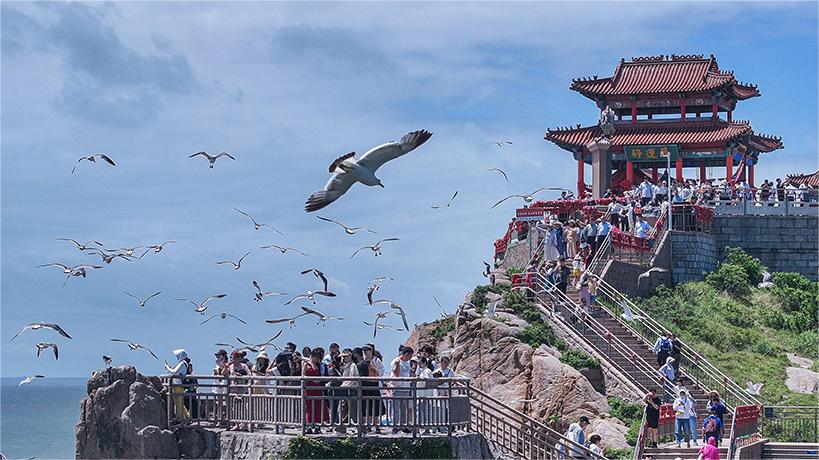Nation adds 3 ports to visa-free transit policy

Tourists from Italy pose for a group photo after practicing tai chi at Beijing's Tiantan Park earlier this month. China's 144-hour visa-free transit policy has significantly boosted inbound travelers' enthusiasm for visiting the country. (JU HUANZONG/XINHUA)
China has expanded the implementation of its 144-hour visa-free transit policy to three more entry ports, bringing the total number of such ports to 37, the National Immigration Administration announced on Monday.
The entry process for foreign nationals has also been streamlined to facilitate their short-term activities related to tourism, business, and family reunions within the country.
The three new ports are Zhengzhou Xinzheng International Airport in Central China's Henan province, and the Lijiang Sanyi International Airport and Mohan railway port in Southwest China's Yunnan province, the administration said in a statement.
Starting on Monday, eligible foreign nationals can enter China visa-free through the Zhengzhou airport, with their visit and stay limited to Henan.
Those entering China visa-free through Yunnan are allowed to visit nine cities or prefecture-level areas in the province including Kunming, Lijiang, Dali, Yuxi, Pu'er, and Xishuangbanna, according to the administration. Previously, foreign nationals could only stay in Kunming.
Foreign nationals from 54 countries, including Austria, Belgium, and the Czech Republic, who hold valid international travel documents and onward tickets with confirmed dates and seats are eligible for the 144-hour visa-free transit.
Since its implementation in January 2013, the policy, which was first valid for 72-hour transit and then extended to 144 hours, has played an important role in strengthening China's high-level opening-up efforts, facilitating people-to-people exchanges, and promoting international cooperation, the administration said.
Adding more entry ports to the visa-free transit list will offer foreigners alternative travel options in China, the administration said, adding that it will continue to improve and optimize the policy to welcome foreigners with a more open attitude.
China's visa-free transit policy has been hailed across social media platforms, acknowledging its key role in facilitating international travel, dispelling misconceptions, and promoting global connectivity.
Robert Willis, from the United Kingdom, said the policy will be very useful to him because he runs a business in China. Previously, Willis had to apply for a two-year multiple-entry visa to visit China. He said the new policy will make his future trips more convenient.
Elena, from Russia, who has visited China twice, said she learned about the policy from her boyfriend, who works in Tianjin.
The policy will have a positive impact on travelers from 54 countries, enabling them to visit China more often and more easily and to explore new cities and cultures, Elena said, adding that she hopes the duration of visa-free transit would be extended in the future.
In the first half of the year, immigration authorities nationwide recorded around 14.64 million foreign nationals entering China, up 152.7 percent year-on-year. Among these visitors, 8.54 million utilized the visa-free policy, marking a 190.1 percent year-on-year surge.
The National Immigration Administration said a surge in foreign visitors is expected in the second half of the year, given the growing enthusiasm for the visa-free transit policy and the swift implementation of various other initiatives.
Xu Xiaolei, chief brand officer of Beijing-based CYTS Tours Holding Co, praised the significant impact of the policy in driving inbound tourism, which he said has been particularly evident in recent months.
The policy has streamlined the entry process, reduced visa costs, and provided greater certainty for foreign travelers wanting to explore China, he said.
Furthermore, the policy has catalyzed the growth of associated domestic industries, particularly the inbound tourism sector, which has faced tough challenges, especially during the COVID-19 pandemic, he said. To expedite the recovery of the sector, government bodies and tourism enterprises have collaborated on innovative solutions, he added.
Xu also emphasized the role of the policy in dispelling misconceptions about China, saying that many visitors who experienced the country firsthand realized how different such experiences are from preconceived notions propagated by the Western media. He underlined the potential of travelers sharing their experiences on social media to counter misinformation more effectively.
"The policy is expanding gradually. ... Yunnan and Henan have their distinct attractions, with Yunnan renowned for its natural beauty and Henan celebrated as a cradle of Chinese culture, blending tradition with modernity. This is enhancing the impact of the policy," he said.
Xu stressed the importance of developing tailored inbound tourism products that resonate with foreign visitors while showcasing Chinese culture and progress. Tailored marketing strategies are deemed essential to bolster China's international tourism standing, he said.
Photos
Related Stories
- China sees robust air travel demand during summer holiday season
- China expands visa-free transit policy to more ports
- Cruise market recovery expected to speed up in Q3, serving as a major boon to global tourism industry
- Tourist destinations across China see surge in visitors during peak summer tourist season
- Tourist landmark injects new vitality into urban development in Xi'an
- Nigerian scholars urge expansion of cultural, tourism exchanges with China
Copyright © 2024 People's Daily Online. All Rights Reserved.









